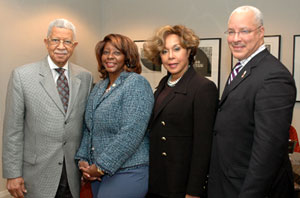
CHICAGO (FinalCall.com) – She brought elegance to the screen and dignity to the image of Black women. And when she was diagnosed with breast cancer at age 63, she did not let the debilitating disease destroy her self-image.
“We must refuse to accept the idea that we are so powerless against cancer,” Diahann Carroll insisted to the “Communities Working Together for a Cure” luncheon held Oct. 11 at Apostolic Church of God. The luncheon was the fruit of an initiative of Governor Rod Blagojevich and the Illinois Department of Public Health to partner with faith-based organizations to facilitate access and awareness of cancer.
The veteran actress recounted the first moments of her battle with breast cancer, from feeling trapped and petrified when she was informed about the “little gray mass.” She did not believe that her body was vulnerable. She ate healthy; she exercised. No woman in her family had ever had breast cancer. Yet, she became one of the women who comprise the 90 percent that do not have any family history yet contract the cancer.
Pointing out that while doctors do not know the causes of breast cancer, she noted to the gasps of the audience of women, that women who have taken birth control pills will have a higher rate of diagnosis later in life. For her own fate, the high stress level of her Hollywood career presented one risk factor.
The Bronx beauty–who has appeared as a special guest star on the new hit ABC series “Grey’s Anatomy”–will always be remembered for her television legacy as the title role on “Julia” and as “Dominique Devereaux” on the “Dynasty”. But in an industry where her marketability is tightly hinged on looks and attractiveness, the actress admitted that she felt that her diagnosis contaminated her image. “It does not matter how educated or sophisticated you are,” she shared, “nothing can insulate you against these images of death and deteriorating disease.”
After taking the audience on her emotional journey from diagnosis to surgery, she urged women to focus on early detection and screening.
“So many women do not receive regular health care. Paying out of pocket for a mammogram is an expense some cannot afford,” she acknowledged, adding to suspicion of the medical field.
These realities contribute to the great disparity in the mortality rates of Black and White women: While Black women do not get breast cancer as much as White women, Black women die from it at greater rates. In Illinois, an estimated 9,000 women will develop breast cancer and 2,000 will die from the disease in a year, according to the American Cancer Society.
Although regular mammograms can significantly reduce the chance of death from breast cancer, nearly half of women in the target age bracket have not had a mammogram in the past two years, the governor’s office reported in a press statement.
For the fiscal year 2007, the Center for Minority Health Services received $4.2 million for the state-wide Communities of Color Breast and Cervical Cancer Initiative, which includes a collaboration between community and faith-based organizations forming a network to provide free breast and cervical cancer screenings with pap smears, mammograms and clinical exams to low-income Black and Latino women in the “Stand Against Cancer” and the “Hispanic Breast and Cervical Cancer” programs. Fiscal year 2006, the initiative reached over 158,000 women with information and screened 18,880 women.
In the end, Ms. Carroll said that her battle with breast cancer tested her character and forced her to become honest with herself.
“When we understand that we are here for a purpose, and that purpose is to be first, human beings, and then to learn to help each other when the opportunity presents itself,” she declared to the applause of the audience, stressing the need to get regular check ups at the doctor. “I ask you, women, to take care of yourselves. We are always in the process of taking care of others.”
(For more information on the “Stand Against Cancer” program, call toll free 1 (888) SAC-HOPE.)












